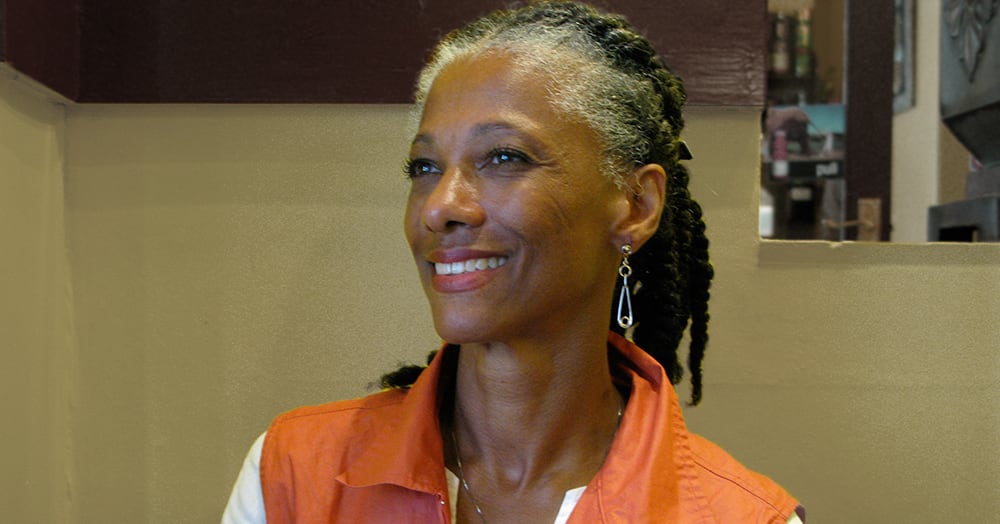Mondrell Oz: Agreeing to Disagree, and Loving It

Girl talk. Women make time for it at Friday night hangouts, Mary Kay parties, and Sunday brunches. They affirm one another, listen to that week’s trials, and share the latest celebrity news disguised as information. But while most women love to talk about everything, they hate to disagree about anything. They often keep their true opinions to themselves and hold conversations on a surface level, maintaining safety by avoiding conflict. Tired of these polite discussions, Dallas Theological Seminary student Mondrell Oz sets aside time once a month for women to go beneath the surface and discuss opposing views on spiritual, racial, and social issues.
A year ago, Mondrell realized she had many friends but she hardly knew where they stood concerning issues such as fidelity, homosexuality, and immigration. Wanting to influence women for Christ, she felt a growing desire to bypass social niceties and talk honestly and deeply with women. As a result, her passion for films gave her an idea to start The Movie Club. She wanted women to view thought-provoking movies that would open dialogue about important topics. So she invited a few friends to a matinee showing of a foreign film and to a lunch afterwards. “The socializing was great,” Mondrell said, “but the women showed a greater enthusiasm for the honest and intense discussion of the subject matter and themes portrayed in the film.”
While the Movie Club serves as an intellectual and social outlet for many of the members, Mondrell sees it from a different perspective. She believes that God uses her and other Christ-followers in the group to share their worldviews in a way that many members have not experienced. The Movie Club also leads to opportunities to share the gospel. The Club, in turn, gives the diverse group members an avenue to discuss divisive issues in a nonthreatening environment.
Participants range in age from thirty-eight to fifty-six and profess Catholic, Protestant, or non-Christian beliefs. The Movie Club has hosted up to twenty members at one time, but a core group of six to eight faithfully show up every month. While their ethnic and religious backgrounds differ, most of the women live in an affluent Dallas suburb, belong to the same fitness club, and have at least an undergraduate degree.
Mutual respect is the Club’s foundation, and the group treats each member with equality, regardless of beliefs. But how do group members avoid offending one another with their comments? “It gets tense,” Mondrell admitted, “but we have all agreed to disagree. And we do it well.” She also prays in about Movie Club events.
The group usually views foreign or independent films because she feels they provide better subject matter for discussion. Recent films include The Artist, Incendies, The Descendants, The King’s Speech, and Beginnings. From Mondrell’s view, these movies have provided opportunities for the group to think about sin and brokenness. As expected, her views usually conflict with those who do not share a Christian perspective. “Deep and intense conversations allow me to challenge non-Christian women in our group with a view alternate to the ones common to their world,” she said.
But the conflicting views sometimes even arise between the Christians in the group. The movie “Beginnings,” with a plot that includes a woman involved in an adulterous affair, caused a tension-filled discussion on infidelity. While the Bible clearly states that infidelity is wrong, and most of the women agreed that fidelity required faithfulness between husband and wife, a Christian in the group believed partner swapping, commonly called swinging, still fell within the bounds of fidelity. Mondrell admitted it was hard for her, as a Christ-follower, to listen to the conversation without immediately confronting the idea with judgment. But she believes that kind of dialogue has allowed her to better understand her fellow members.
For Mondrell Oz, The Movie Club has fulfilled a personal need and spiritual calling to go into her world and make disciples. It serves as a vehicle through which God allows her to reach women in a unique way. It has also improved the way she communicates biblical truths and shares the gospel, her ultimate goal. “I listen more and talk less, which isn’t easy. And when I talk, I’m learning to speak the truth in love.”

